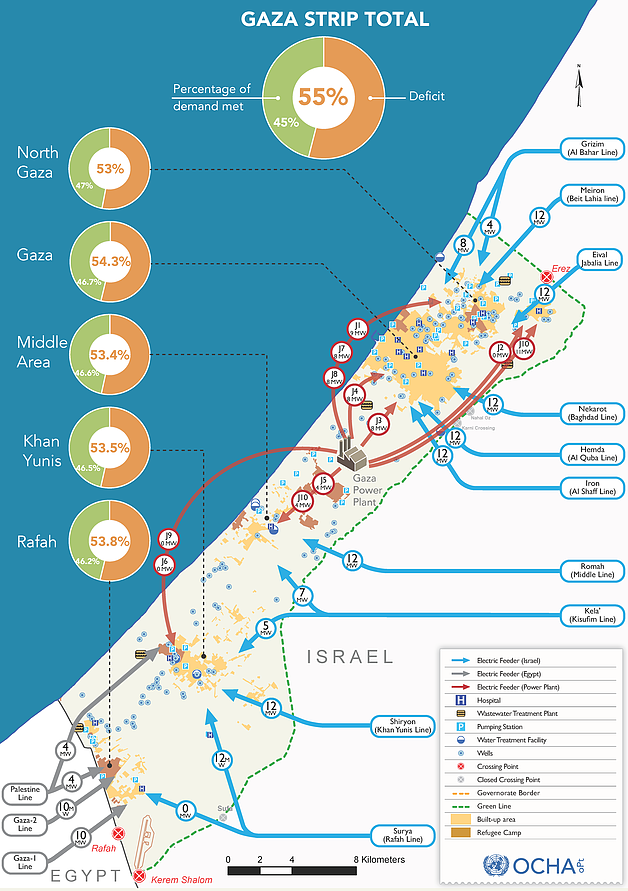The Humanitarian Impact of Gaza’s Electricity and Fuel Crisis | July 2015

Key facts
- An Israeli airstrike in June 2006 targeting the Gaza Power Plant (GPP) marked the start of an electricity crisis in the Gaza Strip, which is still ongoing.
- Electricity demand in the Gaza Strip is estimated at 470 megawatts (MW), of which less than 45% is currently met.
- Rolling blackouts of 12-16 hours per day are seen across Gaza with heavily populated areas being most impacted.
- Due to severe fuel shortages, since July 2013 the GPP has been operating at approximately half of its capacity (60 out of 120 MW) or below, and has been forced to shut down on several occasions.
- In addition to the GPP, Gaza depends on the purchase of electricity from Israel (120 MW) and Egypt (28 MW).
- Nearly 70% of households do not pay their electricity bills due to their inability to afford them or due to lack of enforcement.
- Since November 2013, humanitarian agencies and donors have spent over US$ 11 million in emergency fuel support to critical service providers.
- More than 70% of households in Gaza are being supplied with piped water for 6-8 hours only once every two to four days, due to insufficient power supply (WASH cluster).
- Up to 90 million litres of partially treated sewage are being discharged into the Mediterranean Sea every day, partially due to electricity and fuel shortages (WASH cluster).
- Waiting time for some types of elective surgery at Gaza’s largest hospital (Shifa) extending up to 18 months (WHO).
- The chronic electricity deficit affecting Gaza over the past nine years has disrupted the delivery of basic services and undermined already vulnerable livelihoods and living conditions. The situation has further deteriorated since June 2013, following the halt in the smuggling of Egyptian-subsidized fuel used to operate the GPP, via the illegal tunnels.
- The functioning of the GPP has been significantly impaired over the past several years by additional factors. These include ongoing disputes between Palestinian authorities in Gaza and Ramallah over the funding of fuel for the GPP; the limited collection of bills from consumers; the destruction of fuel storage tanks by an Israeli airstrike in July 2014; and the restrictions on the import of spare parts, equipment, and fuel in the context of Israel’s blockade. The resulting decline has been exacerbated by the poor state of the distribution network, which results in significant electricity losses.
- To cope with the long blackouts, service providers and private households have resorted to backup generators, which are unreliable due to their dependence on unaffordable fuel and spare parts. Private mobile generators can be particularly unsafe, environmentally polluting, and are not affordable by the poorest.
- Medical services, including life-saving capacity, have been severely affected. Constant fluctuations in power supply have resulted in the malfunctioning of sensitive medical equipment, including ultrasound, X-ray, laboratory machines, cardiac monitors, sterilizing machines and infants’ incubators. To prioritize emergency surgery, hospitals have had to postpone elective surgery, which, even if not life-threatening, can have a range of negative ramifications on the affected patients.
- The insufficient supply of electricity and fuel to operate water pumps and wells has caused a further reduction in the availability of running water in most households. This has increased people’s reliance on private, uncontrolled water suppliers and lowered hygiene standards. Wastewater treatment plants have also shortened treatment cycles, thus increasing the pollution level of partially treated sewage discharged into the sea. There is a constant risk of back-flow of sewage onto streets.
- A number of long and medium-term options to address Gaza’s electricity deficit, including running the GPP on natural gas (to be purchased from Israel or supplied from Gaza’s gas fields on the sea) and purchasing additional 100MW from Israel. However, these options are currently on hold due to political reasons. In the short term, to mitigate the humanitarian impact of the current crisis, all stakeholders need to ensure that the GPP is supplied with enough fuel to operate it at full capacity.










